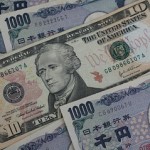US dollar marked its second daily drop against the Japanese currency on Monday, as weaker than projected US non-farm payrolls, reported on Friday, continued to weigh on the greenback, dimming expectations that the Federal Reserve Bank will begin tapering its bond purchases soon.
USD/JPY slid to its lowest point today at 98.27 at 7:23 GMT, also the lowest since August 1st, after which consolidation followed at 98.43, erasing 0.53% for the day. Support was expected to be received at August 1st low, 97.64, while resistance was to be encountered at August 1st high, 99.56.
On Friday the Bureau of Labor Statistics in the United States said that employers added a lesser number of jobs than projected in the month of July. Non-Farm Payrolls indicator increased by 162 000 in July, while preliminary estimates pointed an increase by 184 000 jobs. June’s result was revised down to 188 000 from 195 000 previously. On the other hand, a separate report showed that unemployment rate in the United States decreased by 0.2% to 7.4% in July, reaching its lowest level since December 2008.
“You would have thought the U.S. dollar will come off a little bit,” said Tim Kelleher, the head of institutional foreign-exchange sales in Auckland at ASB Institutional, cited by Bloomberg. “The jobs number was a little bit disappointing for the hawks.”
The greenback lost positions against most of its Asian counterparts, following the release of Chinese data, which submitted a signal that a slowdown in the second-largest economy worldwide is moderating, boosting demand for safe haven currencies. The non-manufacturing Purchasing Managers’ Index advanced to a reading of 54.1 during July from 53.9 in June, the National Bureau of Statistics and China Federation of Logistics and Purchasing reported on August 3rd. Values above the key level of 50.0 signal expansion.
Meanwhile, about half of the 54 economists in a conducted survey by Bloomberg on July 18th-22nd expected that the Federal Reserve Bank was going to decide to pare its asset purchases at its meeting on September 17th-18th. The central bank has devised a plan to keep interest rates close to zero as long as the unemployment rate in the country stood above 6.5% and inflation outlook did not surpass the 2.5% target.
Elsewhere, the Japanese yen was trading higher against the euro as well, with EUR/JPY cross decreasing by 0.43% to 130.79 at 7:50 GMT. GBP/JPY pair also dropped by 0.30% to trade at 150.70 at 7:51 GMT.





